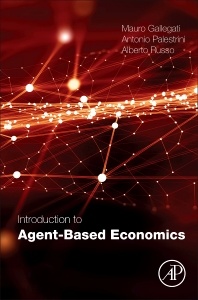Description
Introduction to Agent-Based Economics
Coordinators: Gallegati Mauro, Palestrini Antonio, Russo Alberto
Language: English
Subject for Introduction to Agent-Based Economics:
Support: Print on demand
Description
/li>Contents
/li>Readership
/li>Biography
/li>Comment
/li>
Introduction to Agent-Based Economics describes the principal elements of agent-based computational economics (ACE). It illustrates ACE?s theoretical foundations, which are rooted in the application of the concept of complexity to the social sciences, and it depicts its growth and development from a non-linear out-of-equilibrium approach to a state-of-the-art agent-based macroeconomics. The book helps readers gain a better understanding of the limits and perspectives of the ACE models and their capacity to reproduce economic phenomena and empirical patterns.
Part 1 An Introduction to Agent-Based Computational Economics
Part 2 Macroeconomic Agent-Based Computational Economics 1. Decentralized Interacting Macroeconomic Models and the Agent Based "Modellaccio" 2. AS-AD Representation of Macroeconomic Emergent Properties 3. Macroeconomic ABM and DSGE Models 4. Early Warning Indicator for Crises in an Agent Based Macro Model
Part 3 Macroeconomic ABM: Perspectives and Implications 5. Expectation Models in Agent-Based Computational Economics 6. Experimental Economics for ABM Validation 7. Econometric Methods for Agent Based Models 8. Modeling the Joint Distribution of Income and Consumption in Italy: A Copula-Based Approach with k-generalized Margins 9. A Networked Economy: A Survey on the Effect of Interaction in Credit Markets
Upper-division undergraduate and graduate level students worldwide working in agent-based computational economics and finance
Antonio Palestrini is an Associate Professor of Economics at the Università Politecnica delle Marche, Ancona (Italy) where he obtained his Ph.D. in Economics. He was a vising post-doc at the University of Madison – Wisconsin (1999); a visiting scholar at the Department of Economics – University of Technology, Sidney (AUS) where he collaborated with Carl Chiarella (2001), and a visiting scholar at the Brookings Institute, Washington DC (USA) where he collaborated with Robert Axtell (2006). His main research interests are business cycles, industrial dynamics, financial fragility, and mathematical finance. He published in international journals such as "Journal of Economic Behavior and Organization," "Ecological Economics," "Macroeconomic Dynamics," "Journal of Economic Dynamics and Control," "Economics Letters," and "Information Sciences."
Alberto Russo is Assistant Professor in Economics at the Università Politecnica delle Marche, Ancona (Italy). He obtained his Ph.D. in Economics from the University of Pisa. His research interests include agent-based macroeconomics, financial fragility and systemic risk, social classes and distribution, and experimental economics. He published in recognized journals such as JEDC, JEBO, and JEIC. He is Associate Editor of "Complexity Economics."
- Reviews the literature of agent-based computational economics
- Analyzes approaches to agents’ expectations
- Covers one of the few large macroeconomic agent-based models, the Modellaccio
- Illustrates both analytical and computational methodologies for producing tractable solutions of macro ACE models
- Describes diffusion and amplification mechanisms
- Depicts macroeconomic experiments related to ACE implementations
These books may interest you

Macroeconomics For Dummies - UK 24.87 €



